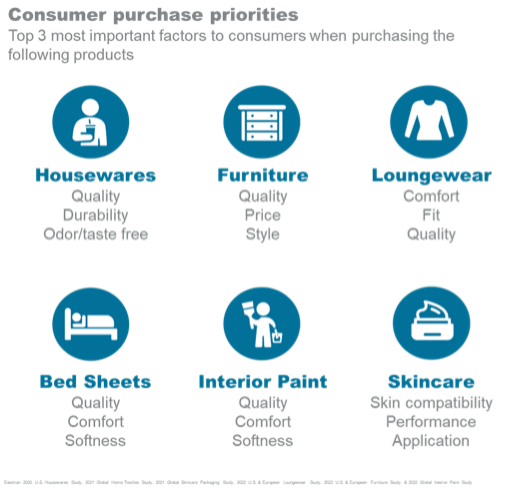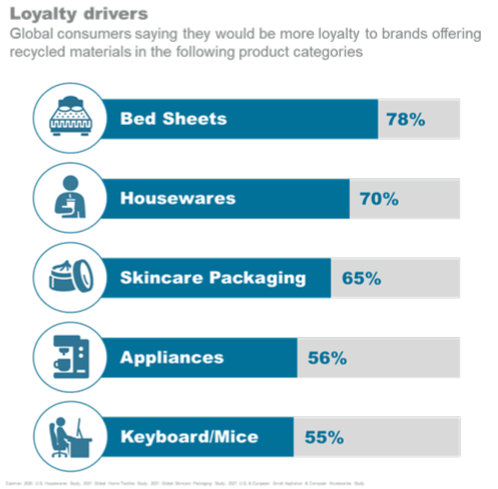Today’s beauty shoppers demand sustainable products. As a result, a growing number of beauty and cosmetic companies are rolling out aggressive sustainability goals to address big environmental challenges. They are reimagining supply chains, business practices, and products. But to be truly successful, brands need to keep the consumer—and what they want—at the heart of their sustainability strategy. For brands to achieve their commitments and growth objectives, they must bring consumers along on the journey. This can be done through education, messaging, and increased engagement.
Developing sustainable material solutions to help solve the world’s biggest challenges and meet consumer needs is at the core of who Eastman is. Over the past few years, we have invested in global studies to understand how to position sustainability with consumers across key industries such as cosmetics and skin care, fashion, electronics, housewares, and building and construction. With a database of more than 40,000 consumers across the U.S., Europe, and Asia, Eastman is developing insights to help our brand partners talk about sustainability in a way that matters to consumers.
Purchase priorities
While companies are hyper focused on sustainability, consumers are also concerned with product quality and performance. Eastman has seen quality and performance show up in the top three most important factors consumers consider when purchasing products across categories, including skin care. Sustainability is near the bottom of the list. This doesn’t mean these consumers don’t care about sustainability. It does mean that when brands and retailers offer more sustainable products, they can’t compromise on the quality and performance consumers expect.
“We understand that consumers have countless options for cosmetic and personal care products. And none of us want to make trade-offs,” said Tara Cary, segment market manager for Eastman cosmetics and personal care. “The Eastman Cristal™ Renew portfolio of resins, made via our molecular recycling technologies, enables brands to give their consumers the high levels of recycled content they are looking for while maintaining the superior quality and premium design elements they demand. With the Cristal One Renew portfolio, we can offer brands material solutions that gives consumers more of what they want—recycled content and recyclability—in a beautiful package.”
To have a successful sustainability strategy, companies must be adept at explaining how their products will meet or exceed consumer performance and quality expectations.

Materials matter
Complexity and constant evolution can make your sustainability journey feel like a winding mountain road. Many brands don’t even know where to start. Consumers will tell you it’s all about the materials. According to Eastman research, sustainability is defined by what a product is made of—making material selection for ingredients and packaging the cornerstone of a brand’s successful sustainability strategy.
In fact, more than half of global consumers say they would be more loyal to brands offering products with recycled materials compared to those that do not, proving that materials really do matter. Companies that move first to offer recycled content in products have an opportunity to increase brand equity and consumer loyalty—further demonstrating how the right sustainable solution coupled with consumer education can unlock new value in the beauty and cosmetics market.
Eastman is working with some of the top names in beauty, helping them move the needle and think innovatively about sustainability. This is how the Estée Lauder Companies connects material performance and sustainability. "Eastman's molecular recycling technologies and portfolio of Renew products will help drive the achievement of the company's sustainable packaging goals while maintaining the high quality aesthetic, safety, and performance of our prestige products,” said Roberto Magana, senior vice president and chief procurement officer for the Estée Lauder Companies.

Intrigued? Want to learn more about how to address the sustainability needs of today’s cosmetics consumers? If you’d like to dig deeper into this topic, join Eastman and Beauty Packaging for a webinar titled “Giving Them What They Want: How to Satisfy the Sustainable Beauty Shopper.”
Developing sustainable material solutions to help solve the world’s biggest challenges and meet consumer needs is at the core of who Eastman is. Over the past few years, we have invested in global studies to understand how to position sustainability with consumers across key industries such as cosmetics and skin care, fashion, electronics, housewares, and building and construction. With a database of more than 40,000 consumers across the U.S., Europe, and Asia, Eastman is developing insights to help our brand partners talk about sustainability in a way that matters to consumers.
Purchase priorities
While companies are hyper focused on sustainability, consumers are also concerned with product quality and performance. Eastman has seen quality and performance show up in the top three most important factors consumers consider when purchasing products across categories, including skin care. Sustainability is near the bottom of the list. This doesn’t mean these consumers don’t care about sustainability. It does mean that when brands and retailers offer more sustainable products, they can’t compromise on the quality and performance consumers expect.
“We understand that consumers have countless options for cosmetic and personal care products. And none of us want to make trade-offs,” said Tara Cary, segment market manager for Eastman cosmetics and personal care. “The Eastman Cristal™ Renew portfolio of resins, made via our molecular recycling technologies, enables brands to give their consumers the high levels of recycled content they are looking for while maintaining the superior quality and premium design elements they demand. With the Cristal One Renew portfolio, we can offer brands material solutions that gives consumers more of what they want—recycled content and recyclability—in a beautiful package.”
To have a successful sustainability strategy, companies must be adept at explaining how their products will meet or exceed consumer performance and quality expectations.

Materials matter
Complexity and constant evolution can make your sustainability journey feel like a winding mountain road. Many brands don’t even know where to start. Consumers will tell you it’s all about the materials. According to Eastman research, sustainability is defined by what a product is made of—making material selection for ingredients and packaging the cornerstone of a brand’s successful sustainability strategy.
In fact, more than half of global consumers say they would be more loyal to brands offering products with recycled materials compared to those that do not, proving that materials really do matter. Companies that move first to offer recycled content in products have an opportunity to increase brand equity and consumer loyalty—further demonstrating how the right sustainable solution coupled with consumer education can unlock new value in the beauty and cosmetics market.
Eastman is working with some of the top names in beauty, helping them move the needle and think innovatively about sustainability. This is how the Estée Lauder Companies connects material performance and sustainability. "Eastman's molecular recycling technologies and portfolio of Renew products will help drive the achievement of the company's sustainable packaging goals while maintaining the high quality aesthetic, safety, and performance of our prestige products,” said Roberto Magana, senior vice president and chief procurement officer for the Estée Lauder Companies.

Intrigued? Want to learn more about how to address the sustainability needs of today’s cosmetics consumers? If you’d like to dig deeper into this topic, join Eastman and Beauty Packaging for a webinar titled “Giving Them What They Want: How to Satisfy the Sustainable Beauty Shopper.”












